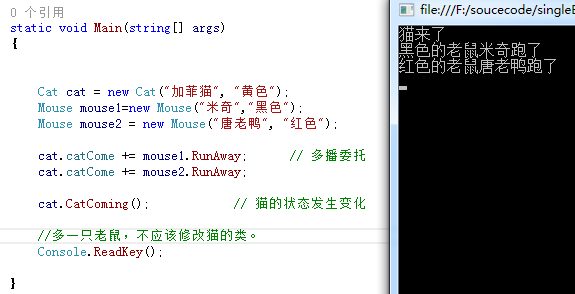C# 观察者模式
一、定义
观察者模式(Observer Pattern)是设计模式中行为模式的一种,它解决了上述具有一对多依赖关系的对象的重用问题。此模式的参与者分为两大类,一类是被观察的目标,另一类是观察该目标的观察者们。正因为该模式是基于“一对多”的关系,所以该模式一般是应用于由一个目标对象和N个观察者对象组成(当然也可以扩展为有多个目标对象,但我们现在只讨论前者)的场合。当目标对象的状态发生改变或做出某种行为时,正在观察该目标对象的观察者们将自动地、连锁地作出相应的响应行为。
二、测试事例
猫来了,老鼠走了。
其中猫为被观察的目标,老鼠为观察者,当猫来了行为发生时,老鼠们会做出逃跑的响应行为。
1. 猫和老鼠封装类
1 class Cat 2 { 3 private string name; 4 private string color; 5 6 public Cat(string name, string color) 7 { 8 this.name = name; 9 this.color = color; 10 } 11 12 /// <summary> 13 /// 猫进屋(猫的状态发生改变) 14 /// </summary> 15 public void CatComing() 16 { 17 Console.WriteLine("猫来了"); 18 19 if (catCome != null) 20 catCome(); 21 } 22 public Action catCome; // 委托 23 }
1 class Mouse 2 { 3 private string name; 4 private string color; 5 6 public Mouse(string name, string color) 7 { 8 this.name = name; 9 this.color = color; 10 } 11 12 /// <summary> 13 /// 逃跑功能 14 /// </summary> 15 public void RunAway() 16 { 17 Console.WriteLine(color + "的老鼠" + name + "跑了"); 18 } 19 }
2. 测试代码
1 class Program 2 { 3 static void Main(string[] args) 4 { 5 6 7 Cat cat = new Cat("加菲猫", "黄色"); 8 Mouse mouse1=new Mouse("米奇","黑色"); 9 Mouse mouse2 = new Mouse("唐老鸭", "红色"); 10 11 cat.catCome += mouse1.RunAway; // 多播委托 12 cat.catCome += mouse2.RunAway; 13 14 cat.CatComing(); // 猫的状态发生变化 15 16 //多一只老鼠,不应该修改猫的类。 17 Console.ReadKey(); 18 19 } 20 }
3. 运行截图

三、适用场景
- 当对一个对象的改变需要同时改变其他对象,而又不知道具体有多少对象有待改变的情况下。
- 当一个对象必须通知其他对象,而又不能假定其他对象是谁的情况下。



 浙公网安备 33010602011771号
浙公网安备 33010602011771号